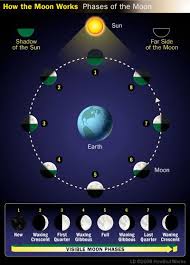Tuesday 03 December 2013 (30th Kislev 5774).
After sundown it will be Wed, 4 December 2013 = 1st of Tevet, 5774
Tevet is the 10th month on the Hebrew/Babylonian calendar.
YHVH calendar on this day is 30/10/5774.
The History of Rosh Chodesh: Reference (www.hebrew4-christians.com/)
According to Rabbinic tradition, the very first commandment given to the children of Israel after being delivered from Egypt was to sanctify the new moon (Exodus 12:1-2), thereby causing the fledgling nation to depart from the solar tradition of the Egyptians (Ra worship) and to look to the moon for new means of reckoning time and seasons.
The emergence of the moon – from darkness to light – is a picture of HaShem’s salvation for the Jewish people and our personal deliverance from darkness to light. Note that the word for month is chodesh, etymologically related to chadash, meaning new.
Knowing precisely when Rosh Chodesh began was critical to the order of the mo’edim, or appointed times commanded by HaShem. In fact the entire Jewish calendar was dependent upon knowing when Rosh Chodesh began, and without this information the set times for the festivals and holidays would be lost. Therefore , during times of persecution (e.g., by the Syrian-Greeks). the Jews were often forbidden to observe Rosh Chodesh as well as Shabbat, in order to keep them from obeying Yahweh.
Some More History from Our Orthodox Brothers: Reference (www.ou.com/)
THE MONTH OF TEVET
The month of Tevet is the tenth in the number of months counting from Nisan. The name Tevet was acquired in Babylonia, as is the case with the names of the other Hebrew months. In the Scroll of Esther (Chapter 2) the month is referred to as, “the tenth month, which is the month of Tevet.”
A Month of Anguish
During the month of Tevet, three fast days are observed, the 8th, 9th and 10th of the month, in commemoration of three major calamities which befell the People of Israel.
The fast days of the 8th and 9th of Tevet are called ‘fast-days-for-the-righteous,’ as on these days, only individuals who choose to, fast, whereas the fast of the 10th of Tevet is a public fast obligating the entire Jewish community.
What Happened?
0n the 8th of Tevet, at the beginning of the “Greek Era,” the Torah was translated into Greek by the decree of King Ptolemy, in about the year 313 B.C.E., according to the Bayit Sheni Timeline presented in the Chanukah Section, which locates the date of the Destruction of the First Temple in 423 B.C.E. This corresponds to the approximate year of 476 B.C.E., according to the alternate timeline which locates the Destruction at 586 B.C.E. That day was regarded as equally calamitous for Israel as the day on which the Golden Calf was made, since it is impossible to adequately translate the Torah.
Moving backwards in time, the 9th of Tevet commemorates the death of both Ezra the Scribe and Nechemia, two of our greatest leaders, who faithfully led Israel during the return from Babylonian captivity. This occurred in approximately the year 353 B.C.E., according to the first Timeline referenced above, or approx. 516 B.C.E., according to the alternate Timeline. It is said that the eyes of all Israel were clouded by their death, for the loss of these great leaders was a tremendous blow, and Ezra’s stature, in particular, was so great that it is said of him that had the Torah not been given to Israel through Moses, it would have been given to Israel through Ezra.
On the 10th of Tevet, Nevuchadnetzar, King of Babylonia, laid siege to Yerushalayim. The imposition of this vise-like siege occurred in the approximate year 426 B.C.E., according to the Bayit Sheni Timeline, or the approximate year 589 B.C.E., according to the timeline which sets the year of the Destruction of the First Temple as 586 B.C.E.
The walls of Yerushalayim were subsequently breached on the 17th of Tammuz, during the third year of the siege, and the Temple destroyed on Tisha B’Av, the 9th of Av, the saddest day in the Hebrew Calendar, the Date of Destruction of both Temples, and the most somber fast day. But the start of the siege set the stage for both of those tragic events. It was for this reason that the Prophets and other Jewish Leaders of the time set the Tenth of Tevet as a day of fasting for the Jewish People.
In modern day Israel, the 10th of Tevet has been designated as Yom Hakaddish Haklali – the day on which we mourn those whose date or place of death is unknown.
On the 1st of Tevet, Yechoniah, King of Yehudah, was exiled together with the Sages and the nobility, members of the family of royalty, of Yerushalayim. The day was not however designated as a public fast day.
With the exception of the closing days of Chanukah, the month of Tevet contains no Yom Tov or festive day.
Bob Jackson
בוב ג’קסון

